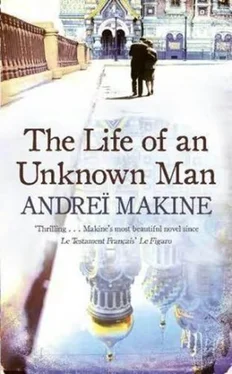Andreï Makine - The Life of an Unknown Man
Здесь есть возможность читать онлайн «Andreï Makine - The Life of an Unknown Man» весь текст электронной книги совершенно бесплатно (целиком полную версию без сокращений). В некоторых случаях можно слушать аудио, скачать через торрент в формате fb2 и присутствует краткое содержание. Жанр: Современная проза, на английском языке. Описание произведения, (предисловие) а так же отзывы посетителей доступны на портале библиотеки ЛибКат.
- Название:The Life of an Unknown Man
- Автор:
- Жанр:
- Год:неизвестен
- ISBN:нет данных
- Рейтинг книги:3 / 5. Голосов: 1
-
Избранное:Добавить в избранное
- Отзывы:
-
Ваша оценка:
- 60
- 1
- 2
- 3
- 4
- 5
The Life of an Unknown Man: краткое содержание, описание и аннотация
Предлагаем к чтению аннотацию, описание, краткое содержание или предисловие (зависит от того, что написал сам автор книги «The Life of an Unknown Man»). Если вы не нашли необходимую информацию о книге — напишите в комментариях, мы постараемся отыскать её.
The Life of an Unknown Man — читать онлайн бесплатно полную книгу (весь текст) целиком
Ниже представлен текст книги, разбитый по страницам. Система сохранения места последней прочитанной страницы, позволяет с удобством читать онлайн бесплатно книгу «The Life of an Unknown Man», без необходимости каждый раз заново искать на чём Вы остановились. Поставьте закладку, и сможете в любой момент перейти на страницу, на которой закончили чтение.
Интервал:
Закладка:

Andreï Makine
The Life of an Unknown Man
Translated from the French by Geoffrey Strachan

Copyright © Éditions du Seuil, January 2009
Translation © Geoffrey Strachan, 2010
Originally published in 2009 as La vie d’un homme inconnu by Éditions du Seuil, 27 rue Jacob, 75261 Paris Cedex 06, France.
Translator’s Note
Andreï Makine was born and brought up in Russia, but The Life of an Unknown Man, like his other novels, was written in French. The book is set partly in Russia, partly in France, and the author uses some Russian words in the French text that I have retained in this English translation. These include shapka (a fur hat or cap, often with earflaps); dacha (a country house or cottage, typically used as a second or holiday home); izba (a traditional wooden house built of logs); and kolkhoznik (a worker on a collective farm).
The text contains a number of references to streets and buildings in Saint Petersburg (formerly Leningrad) on the river Neva, including the famous Nevsky Prospekt, one of the main streets of the city’s center; “Five Corners,” the intersection of five streets on Zagorodny Prospekt; and Smolny, formerly the Smolny Institute, where the Russian Revolution started and which became the headquarters of the Communist Party in Leningrad. The “Scythian gold” alluded to in the text is among the treasures in the Hermitage Museum in Saint Petersburg. A boyar (in Russian, boyarin ) was a member of the aristocracy in Russia from the tenth century until the early eighteenth century, next in rank to a prince. In the performance of Rigoletto at the Leningrad Opera in 1945, referred to in the text, the central character is the king, as in Victor Hugo’s original play, upon which the opera was based, rather than the Duke of Mantua (the change required by nineteenth-century Italian stage censorship and still generally observed).
Characters from French fiction referred to in the text include Rastignac, the character who appears in several of Balzac’s novels, including Père Goriot, and Michel Strogoff, the eponymous hero of the novel by Jules Verne. Prince Myshkin is the central character in Dostoevsky’s novel The Idiot. E. M. Cioran, the Romanian writer who died in Paris in 1995, was known for his pessimistic philosophy expressed in aphorisms. The Latin text quoted on page 15 is from Catullus and may be translated as “she who was loved by me as none will ever be loved.”
I am indebted to a number of people, including the author, for advice, assistance, and encouragement in the preparation of this translation. To all of them my thanks are due, notably to Giles Barber, Ann and Christopher Betts, Thompson Bradley, Edward Braun, Mary Byers, Robert Caston, Ludmilla Checkley, Daphne Clark, Bruce Crisp, June Elks, Will Fyans, Scott Grant, Martyn Haxworth, Wayne Holloway, Russell Ingham, Elsbeth Lindner, Catherine Merridale, Geoffrey Pogson, Pierre Sciama, Simon Strachan, Susan Strachan, Carole Welch, and my editor at Graywolf Press, Katie Dublinski.
G. S.
The Life of an Unknown Man
I

One evening they amused themselves by hurtling down a snow-covered hill on a toboggan. The cold lashed them in the face, a fine cloud of hoarfrost blurred their vision, and at the most thrilling moment of the descent, the young man seated behind her whispered, “I love you, Nadenka.” Mingled with the whistling of the wind and the loud roar of the runners, his murmured remark was barely audible. A declaration? The gusting of the snow flurry? Panting, their hearts laid bare, they climbed back up the slope, plunged into a fresh descent and again that whisper, more discreet still, spoke of a love borne swiftly away on the tempest of white. I love you, Nadenka…
“Goddamn Chekhov! In his day you could still write like that.” Shutov pictures the scene: heady cold, the two timid lovers… Nowadays they’d say it was over the top. They’d mock it as “sentimental rubbish.” Hopelessly old fashioned. And yet it works! He judges it as a writer. Chekhov’s touch is there: yes, the deadpan way he has of rescuing a subject anyone else would have drenched in sugary sentiment.
That “I love you, Nadenka,” under cover of whirling snowflakes. It works.
He smiles wryly, used to being wary of his own enthusiasms. “It works all right, thanks to this bottle of whiskey,” he tells himself, replenishing his glass. And also thanks to his lonely existence in this flat, where one of the occupants is a now absent young woman, Léa, who’s coming tomorrow to collect her things, a pile of cardboard boxes beside the door. A tombstone that precludes any hope of love.
He pulls himself together, dreading the self-indulgent gloom that has dogged him for months. Lonely existence? A fine cliché! Paris is a city of loners… unless you’re Hemingway painting the town red in the twenties. No, Chekhov’s little device works because of the way his story slips forward in time: the two lovers part, settle down, have children, then meet again twenty years later in the same park and laughingly board a toboggan. And it happens all over again: the snowy breeze, the gleeful panic as they twist and turn, the strident screaming of the runners… As they reach top speed the woman hears, “I love you, Nadenka…,” but this murmur is no more than a distant music, protecting the secret of her youthful love.
So simple, yes, and yet so right, so evocative! They could still write like that in the good old days. No Freud, no postmodernism, no sex in every other sentence. And no worrying about what some little idiot with slicked-back hair on a television talk show will say about it. Which is why it still stands up. These days you have to write differently…
Shutov gets up, staggers, stoops over Léa’s things, picks up a book, opens it at random, gives a dry laugh. “The scent of roses? Forget it. What passes from the mistress’s mouth to her lover’s is saliva, along with a whole army of germs. It passes from the lover to his wife, from the wife to her baby, from the baby to its aunt, from the aunt, a waitress in a restaurant, to a customer whose soup she has spat in, from the customer to his wife, from the wife to her lover and thence to other mouths, so that every one of us is immersed in an ocean of intermingled saliva that binds us into one salivary commonwealth, a single moist, united humanity.”
Revolting… And it constitutes an entire credo. Formulated by a writer whom Léa idolizes and whom Shutov regards as drearily pretentious. A far cry from Chekhov. Nowadays a hero has to be neurotic, cynical, impatient to share his unsavory obsessions with us. Because his trouble is that his mother still has him on a leash, even when he makes love. That was how Léa’s idol talked.
“If I’d known my mother,” reflects Shutov, “I’d have spoken about her in my books.” The thought revives in him the oldest memory of his life. A child sees a door closing: without knowing who it is that has just left, he senses it is someone he loves with all his tiny, still-mute being.
Beyond the windowpane, a May night, the fantastical collection of ancient facades marching up the slope of Ménilmontant. How often had he longed to talk to Léa about these moonlit rooftops! As if covered in snow. He had found no image to capture the poetry of this sleeping whiteness. Rooftops made nacreous by the moon? No, that’s not it. In any case, what’s the point of trying to find an evocative phrase? Léa has gone and this “dovecote” (which was what she used to call the converted attic) has reverted into being one of those oddly shaped dwellings that real estate agents advertise under the ambiguous heading: “Unusual property.” Shutov’s face twists into a grimace. “That’s probably how they regard me. Unusual…”
Читать дальшеИнтервал:
Закладка:
Похожие книги на «The Life of an Unknown Man»
Представляем Вашему вниманию похожие книги на «The Life of an Unknown Man» списком для выбора. Мы отобрали схожую по названию и смыслу литературу в надежде предоставить читателям больше вариантов отыскать новые, интересные, ещё непрочитанные произведения.
Обсуждение, отзывы о книге «The Life of an Unknown Man» и просто собственные мнения читателей. Оставьте ваши комментарии, напишите, что Вы думаете о произведении, его смысле или главных героях. Укажите что конкретно понравилось, а что нет, и почему Вы так считаете.









